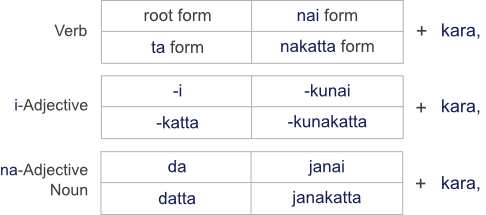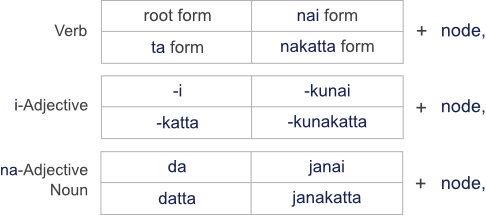|



|
There are some patterns to express reason. Here is described some which are the most frequently used in daily conversation.
kara
Kara has two usages. One is a function as a particle, which shows the starting time or point when it comes after the word for time or place. In this case, it corresponds to the English, "from" like 1-ji kara "from 1:00" or Tokyo kara "from Tokyo."
Another is a function as a Functional Pattern, which shows that a sentence, or the words and phrases, followed by kara indicate the reason for something. It corresponds to the English, "so" or "therefore."
In this case, kara can follow words, phrases or sentences which end with the desu, masu form or the plain form. The use of the desu or masu form sounds formal, and the plain form makes it casual.

| 1. | Yooji ga aru kara (arimasu kara), paatii ni ikimasen. |
| I have something to do, so I won't go to the party. |
| 2. | Kyoo wa nichi-yoobi da kara (desu kara), kooen wa kondeimasu. |
| Today is Sunday, so the park is crowded. |
In these examples, the first part of each sentence, "yooji ga aru" and "kyoo wa nichi-yoobi da" show a reason. Kara always comes after a sentence or the words and phrases for a reason to show that the prior part expresses a reason.
The part for the reason and the part for the conclusion can be inverted as follows.
| 1-b. | Paatii ni ikimasen, yooji ga arimasu kara. |
| 2-b. | Kooen wa kondeimasu, kyoo wa nichi-yoobi desu kara. |
Each of these sentences means the same as the above example, respectively. Pay attention to the placement of kara; it comes after the sentence expressing the reason.
dakara & desukara
After a statement of reason, it is possible to begin the sentence with dakara or desu kara to continue the statement. This usage emphasizes the result or conclusion led by the part of reason. It resembles the English usage of "therefore" or "that's why."
| Smith | : | Rai-shuu otooto ga kekkon shimasu. |
| Satoo | : | Soo desu ka. Omedetoo gozaimasu. |
| Smith | : | Dakara rai-shuu kuni ni kaerimasu. |
| Smith | : | My brother will marry next week. |
| Satoo | : | Really, congratulations. |
| Smith | : | Therefore, I'll go back to my country. |
nazenara
This is often used to give a reason after a question with Dooshite? "why?."
It resembles the English usage of "because."
| Smith | : | Rai-shuu kuni ni kaerimasu. |
| Satoo | : | Dooshite? |
| Smith | : | Nazenara otooto ga kekkon shimasu kara. |
| Smith | : | I'll go back to my country next week. |
| Satoo | : | Why? |
| Smith | : | Because my brother will marry. |
Nazenara shows that the sentence following it indicates a reason, but it is always accompanied by kara at the end of the sentence. Nazenara is used to just emphasize a reason.
node
Node is a pattern used for reason, too. Like kara, it can follow desu, masu or the plain form. The meaning is the same as kara, but node acts as if the part of the reason and the part of the conclusion are parallel, while kara somewhat emphasizes the reason. Therefore, node sounds softer. In formal conversations, node is more often used.
Please note that the plain root form of desu changes to na, not da, when node comes after the plain root form of desu, becoming na-node.

Kyoo wa nichi-yoobi na node, kooen wa kondeimasu.
As today is Sunday, the park is crowded.
| Otooto ga kekkon suru node, rai-shuu kuni ni kaerimasu. |
| Otooto ga kekkon shimasu node, rai-shuu kuni ni kaerimasu. |
| As my brother will marry, I'll go back to my country next week. |
Both sentences mean the same. The expression with -masu node in the lower sentence is very polite.
| Copyright (C) | CosCom Language Service, Inc. | All Rights Reserved. |